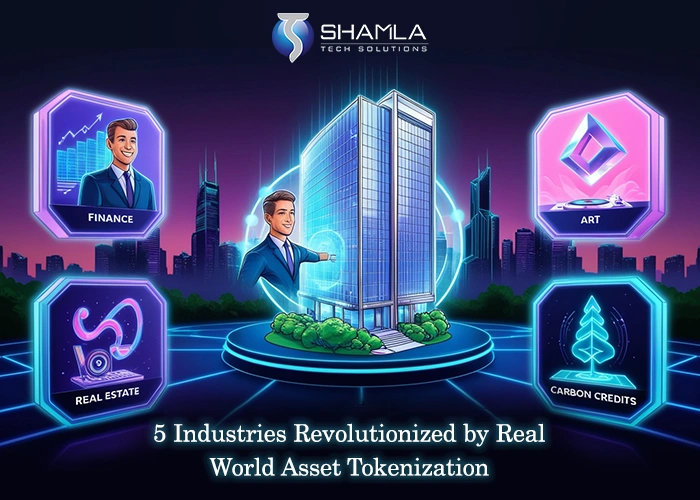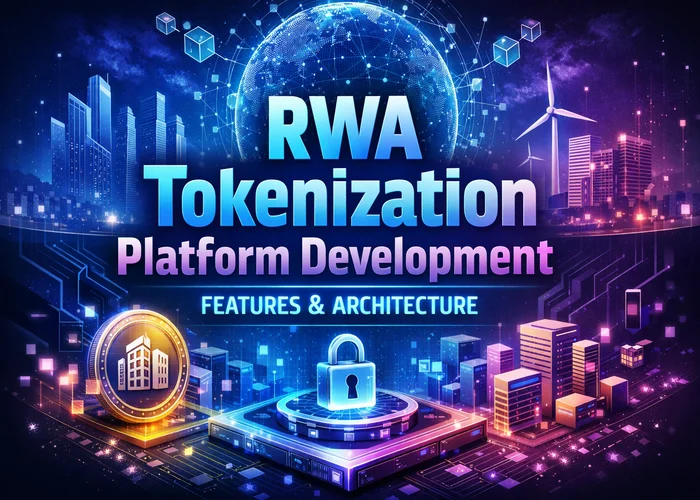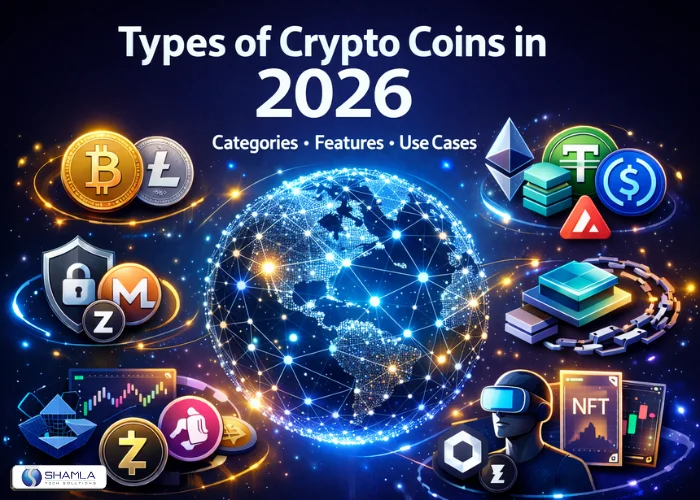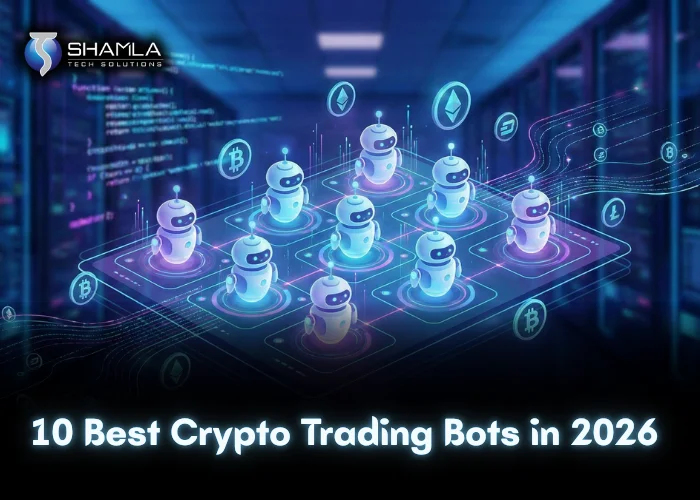One of the big changes that is ongoing across all industries is real world asset tokenization. This tokenization of real world assets turns real things like property, art, or goods into digital tokens using blockchain. These tokens show ownership and make managing assets easier, safer and more transparent. People can even own small parts of big assets. It is solving problems like high costs, lack of access and assets being hard to sell quickly.
Industries like real estate and finance are starting to use this technology to make investing open to more people and find new possibilities. With blockchain, tokenization is not just changing how assets are seen. It is also changing their value and the way they are traded across the world.
This blog talks about how tokenization is affecting five main industries. We will see how it solves problems, gives useful ideas for businesses and shows what the future might look like. Whether you own a business or are just curious, this guide helps you understand tokenized assets and how they can create a fairer and more efficient economy.
What is Real World Asset Tokenization?
Real world asset tokenization is actually the process of turning real things like real estate, art, or goods into digital tokens on a blockchain. These tokens show who owns the asset and make transactions safe, clear and easy. Blockchain helps to digitize these assets, which makes trading and owning them simple.
One big feature of asset tokenization is fractional ownership. This lets people buy small parts of expensive assets, so more people can invest. Tokenized assets also have better security because blockchain keeps records safe from tampering. Plus, they are easier to sell since tokens can be traded worldwide on digital platforms.
For example, properties can turn into digital shares, expensive art can be owned by many people and even commodities like gold and oil can become tokens. This technology is changing the way people manage assets and is making it easier for everyone to invest and grow wealth.
Top 5 Industries Transformed by Real World Asset Tokenization
1. Real Estate
The real estate industry has faced many problems like being hard to sell quickly, high costs to enter and complicated steps that scare small investors. Traditional property investments need a lot of money upfront, involve too much paperwork and take a long time to complete. These things make it tough for most people to join the market. Also, people can’t easily invest in properties outside their own country, which limits their choices.
Real world asset tokenization is changing this by solving these problems. It lets people divide property ownership into small digital parts. So, investors can buy just a piece of a property instead of the whole thing. This helps people with less money to invest in expensive real estate. Tokenization also removes borders, letting investors buy properties worldwide through digital platforms.
Blockchain technology makes everything easier by keeping records safe, clear and fast. It cuts out middlemen, which lowers costs and speeds up deals.
Platforms like Propy and RealT are good examples of this change. They let users invest in tokenized real estate, manage properties easily and access clear ownership records. Tokenization is making real estate open to more people, helping them invest with less money and making the market easier to use for everyone.
2. Art and Collectibles
The art and collectibles market has mostly been for rich people. High prices and limited chances to invest keep smaller investors away. Also, people often doubt if artwork and collectibles are real. Fake items and fraud are common problems. These issues, along with how hard it is to sell art quickly, make investing in art difficult for most people.
Real world asset tokenization is changing this by solving these old problems. With tokenization, expensive art and collectibles can be split into small digital shares. This means many people can own a part of a painting, sculpture, or rare item without needing millions. Tokenization also brings more trust. Blockchain keeps ownership records safe and proves if the items are real.
For artists and collectors, tokenization gives big benefits. Artists can reach more people and collectors can trade tokenized art easily on online platforms, which makes selling faster. Platforms like Masterworks and Maecenas help by giving access to tokenized art investments. These platforms allow people to invest in famous pieces that were only for the wealthy before.
By making art ownership open to more people and improving trust and trading, tokenization is changing how art is bought, sold and valued. It is making the art market available to a global audience.
3. Financial Instruments
The financial industry has been controlled by centralized systems for a long time. These systems create problems like high costs, slow processes and limited access. Traditional markets for things like bonds, stocks and derivatives need middlemen, which causes delays and adds to the expenses. This setup keeps smaller investors away and makes it hard for people around the world to join in. Big companies benefit more, while others face challenges.
Tokenization is changing this by turning financial assets into digital tokens. Tokenization of real world assets like bonds, stocks and derivatives can be traded easily on blockchain platforms. This removes the need for middlemen, cuts costs and speeds up transactions. Fractional ownership also lets more people invest, making the market open to smaller investors.
Blockchain brings more safety and trust by keeping records of every transaction that can’t be changed. This reduces fraud and helps investors trust the system. With tokenization, people can trade financial assets anytime, anywhere, making the market more active and global.
In the future, tokenized assets might completely change capital markets. As rules start to include blockchain, new global investment chances are opening. Platforms like Securitize and Tokeny already help with creating and trading tokenized securities, showing the power of this idea.
By making things clear, easy and open to everyone, tokenization is not just updating financial tools. It is helping to build a worldwide system where anyone can invest. This new way can connect traditional and digital markets and change how investments work.
4. Supply Chain and Commodities
The supply chain and commodities industries face many problems like slow processes, lack of clarity and chances for fraud. Traditional systems depend on many steps and middlemen, which cause delays, mistakes and high costs. Also, it is hard to check where products come from, which allows fake goods to enter the market.
Tokenization is solving these issues by making everything traceable and easier to trade. Blockchain records every step in the supply chain in a way that cannot be changed, which ensures clarity and trust. Tokenization turns assets like gold, oil, or farm products into digital tokens that can be tracked from the source to the buyer. This helps stop fraud and gives people live updates on goods’ movements.
For trading, tokenization makes things faster and cuts out middlemen. Once commodities are tokenized, they can be traded on online platforms. This increases the ease of trading and allows more people to invest. Fractional ownership also helps smaller investors join markets that were mostly for big players before.
An example is the tokenization of gold. Platforms like Paxos and Digix have made gold-backed tokens. These let people buy and sell small parts of physical gold. Tokens make gold trading safer and remove issues like storage and shipping costs.
By bringing more clarity, fixing slow processes and making trading simple, tokenization is changing supply chains and commodity markets. This change builds trust, lowers risks and gives new chances to businesses and investors.
5. Gaming and Virtual Assets
Gamers are now spending a lot of time and money on virtual items like skins, weapons, characters and currencies. But these items often work only in specific games or platforms. They have no value outside these systems. Also, game developers control these assets. Players cannot truly own, trade, or make money from them freely.
Tokenization is changing this. It connects real world assets with gaming economies. In-game items become blockchain-based tokens. This gives players clear ownership and lets them trade or sell their assets on different platforms. Players can now get real world value from their virtual investments.
Tokenization does more than just offer ownership. It creates decentralized marketplaces. These platforms let players buy, sell and trade items directly. They don’t need middlemen. Blockchain records all transactions, making them transparent and trustworthy. Tokenized assets can also work across many games, creating a single gaming economy for players and developers.
Some platforms, like Enjin and Gala Games, are leading this change. They let players earn and trade items easily. This helps players make money from their time and effort in games. The gap between gaming and the real world economy becomes smaller.
Tokenization gives players more control over their digital items. It also brings real world value into games. This is changing how virtual assets are owned and used. It creates a gaming economy that focuses on players. This change opens up many new ideas and opportunities.
Implementing Real World Asset Tokenization and its Benefits
Identify Eligible Assets: The first step is to carefully identify which assets you will be tokenizing for your business. They can be anything like real estate, intellectual property, commodities, finance products, art, or even shares of a company. Bottomline, any asset that holds a value can definitely be divided into smaller parts and is eligible for tokenization. It is also super important to make sure that the assets that you tokenize have clear ownership which can be verified at ease. The assets that you tokenize should also be able to be represented digitally on a blockchain network which will enhance transparency and traceability.
Steps to Tokenize:Tokenization is a process with several important steps. First, businesses must check the legal rules about tokenizing their assets. These rules change depending on the region, so it’s important to speak with legal experts. They can help businesses understand laws about securities, taxes and digital assets. Following these rules helps businesses avoid legal issues or penalties.
After successfully implementing the above steps, businesses should pick the blockchain platform which is best suitable for their tokenization of real world assets. It is advisable for them to choose Ethereum, Polkadot and Stellar because these platforms are so secure and can handle any volume of transactions. In the process of choosing their blockchain platform, businesses should also consider more things like the transaction fees that come with it, the platform’s speed and if it works smoothly with the type of their asset.
Then, businesses can create tokens that represent their assets. These tokens are like digital versions of the real-world asset. The next step is to offer these tokens to investors or stakeholders through a smart contract. Smart contracts make the process automatic, secure and transparent, helping businesses manage tokenized assets easily.
Benefits for Businesses: Tokenization offers many benefits for businesses. The best benefit of this is how it lowers costs. By cutting out middlemen and making processes easier, tokenization reduces transaction costs and lessens administrative work. Tokenization also helps businesses attract more investors, which increases market activity and liquidity. It also broadens a company’s reach, allowing it to enter global markets and create a more open investment environment.
Factors to Consider When Implementing Tokenization
Implementing real world asset tokenization in your business can bring great benefits, but it needs careful planning and thought about several things to make it work. Here are some important points to remember when adopting tokenization.
Regulatory Compliance: One of the most important parts of tokenization is following legal rules and local regulations. Laws for tokenizing real-world assets are still changing and are different in each region. So, it is important to talk to legal experts. They will guide you on topics like taxes, securities laws and data privacy. If you do not follow the right legal steps, you may face penalties, legal troubles, or delays in your tokenization process. Following the rules keeps your business running smoothly and reduces risks in tokenization.
Choosing the Right Blockchain Platform: Choosing the right blockchain platform is very important for tokenization. You need to think about scalability, security and transaction speed. A good blockchain must handle many transactions and still stay secure. People mostly use Ethereum for tokenization. But, platforms like Polkadot and Stellar might work better for faster transactions or lower costs. You should pick the platform that fits your business needs. It must support the tokenization process and keep it safe and efficient.
Market Demand and Audience: Before moving forward with tokenization, businesses must assess market demand and understand their target audience. Consider the appeal of the asset being tokenized and whether there is enough investor interest. Understanding the preferences of your audience and how easily the tokenized asset can be traded is crucial. This knowledge helps businesses develop a strategy that boosts participation and maximizes profits. By aligning the tokenized asset with market interests, businesses can attract more investors and ensure the success of their tokenization efforts.
Risk Management: Tokenization uses blockchain technology. It is secure but still has some risks. To stop problems like hacking, smart contract bugs, or network failures, businesses need to use strong cybersecurity measures. Regularly checking risks is important to find weaknesses and stop threats. Audits of smart contracts and system security must be done often to fix problems quickly. Staying alert and active helps businesses lower risks. This way, they can keep their assets safe and make sure tokenized platforms and transactions work smoothly.>
Conclusion
The future of real world asset tokenization looks bright, as it changes the global markets. Tokenization makes handling assets more efficient, clear and easy for everyone. It brings new chances for businesses, investors and people. As more assets, like real estate, art, financial instruments and commodities, get digitized and tokenized, this technology will affect many industries.
Tokenization is becoming an important tool to give people easier access to valuable assets, increase liquidity and open new investment opportunities. For businesses, using tokenization is a smart choice that can lower costs, widen market participation and make processes more efficient. By using tokenization, companies can offer more investment options, make their work faster and reach people worldwide.
As tokenization grows and improves, businesses that use this technology will lead the way in the digital economy. Tokenization is changing how we think about assets, investments and economic activity, showing a future that is clearer, faster and without borders. Businesses that start using tokenization now will get the most out of it, finding new ways to grow and succeed in the digital world.
If you need to tokenize real world assets and grow your business, partner with us. We are Shamla Tech, a top company specializing in real world asset tokenization. Our services help businesses to get new investment opportunities, increase their liquidity and streamline processes.
Contact us today to learn how we can help you tokenize your assets and take your business to the next level.








